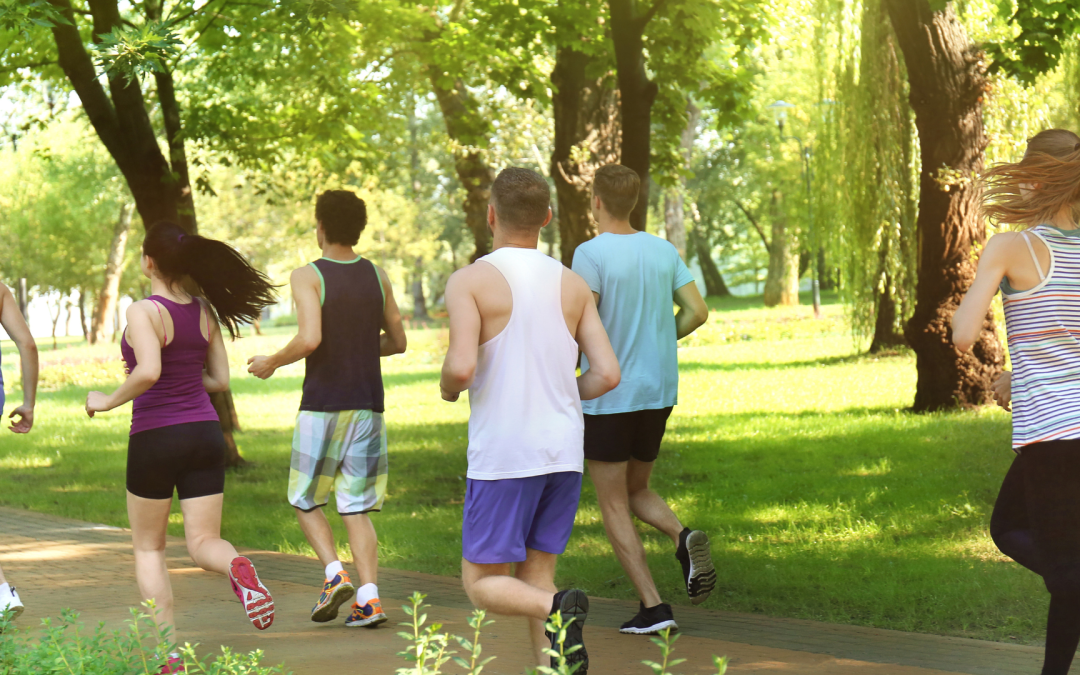Physical activity for wellbeing

We know that exercise is good for our health. Research is increasingly evidencing the positive impact on both physical and mental health. However, for many of us what type of activity and how much is less clear.
Exercise, physical activity, and our health
We have understood for a long time that exercise is good for our health. Historically this was considered more in relation to fitness and physical health, however, we are now learning more about the impact on different aspects of both physical and mental health.
Benefits of activity and exercise
Physical activity is a movement of the body that uses energy and can apply to all movement during the day. A lack of physical activity is a leading risk factor for many non-communicable diseases, with a 20-30% increased risk of death compared to active people (WHO).
Regular physical activity improves cardiorespiratory systems, supports bone health, and reduces the risk of diabetes, stroke, various types of cancer, and coronary heart disease (WHO).
Research overwhelmingly shows the benefits of physical activity on mental health, not just in reducing the incidence of mental illness, specifically depression and anxiety, but also contributing to improved mental wellness with greater overall happiness, self-esteem, and general cognitive functioning (John Brick Foundation).
Guidance on activity levels
The guidance varies slightly between different authorities e.g. NHS, WHO, American College of Sports Science, and there are other influencing factors including age, but the consensus for adults aged 16-64 is:
- Do at least 150 – 300 minutes of moderate to intense activity in a week
- Activity should be spread over 4-5 days each week
- Include some form of muscle strengthening exercises on at least a couple of days a week. This becomes increasingly important as we get older.
- Build more general movement into your day and reduce the amount of time being sedentary. For example, if you are in a desk based role build in regular stretching or short walks during the day.
Moderate and intense physical activity
When life is busy we have to be proactive about building in activity. Some people thrive on high levels of activity and the guidance creates no challenge, others find it harder to meet these levels.
Activity doesn’t have to be ‘sport’ or going to the gym, it can be any activity that involves movement and increases the heart rate. Examples of moderate intensity exercise include brisk walking, riding a bike, mowing the grass, doubles tennis.
More vigorous activities include swimming, aerobic exercises, heavy manual work in the garden, team sports.
Any activity is better than doing nothing!
Tips to increase physical activity
- Identify activities you will enjoy as you are more likely to do them. There is such a wide range of options, everybody should be able to find something!
- Plan it into your diary in the same way as other things you commit to doing.
- If you don’t have time for a long walk, go for a short one! Build the habit.
- If you are someone who ‘hates’ exercise find things that you can incorporate into your day in a way that you are likely to manage, perhaps rather than meeting someone for a coffee, arrange to go for a walk with them. Try walking upstairs rather than taking the lift. Walk somewhere nearby rather than jumping in the car as your default.
- If you like the incentive of challenge join one of the many available e.g. couch to 5K app, or walking a certain number of miles in a month.
- Remove barriers to taking part. For example, if we think we will go home and have a cup of tea and then go to the gym, it is less likely to happen than if we plan to go on the way home.
- Exercise first thing before the long list of tasks to do gets in the way. If you go for a walk in the morning, you get the additional benefits of exposure to natural day light that is beneficial for our circadian rhythms and helps with sleep.
- Commit to doing something with someone else as you won’t want to let them down.
If you need to up your level of activity commit to one action to start to create a good habit.
Looking after both mind and body is a module of Unleashing You, the Institute of Leadership approved programme for personal growth, increased performance, and enhanced wellbeing, available for organisations as well as individuals.



0 Comments